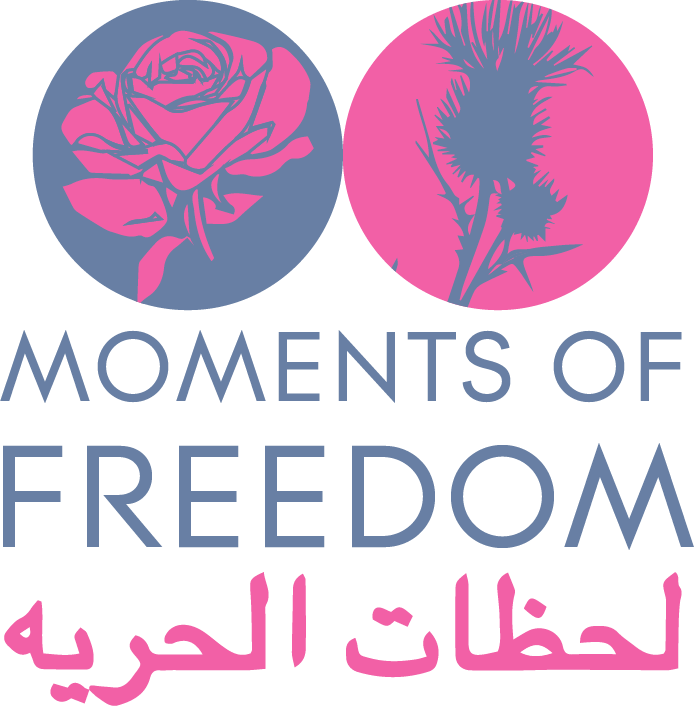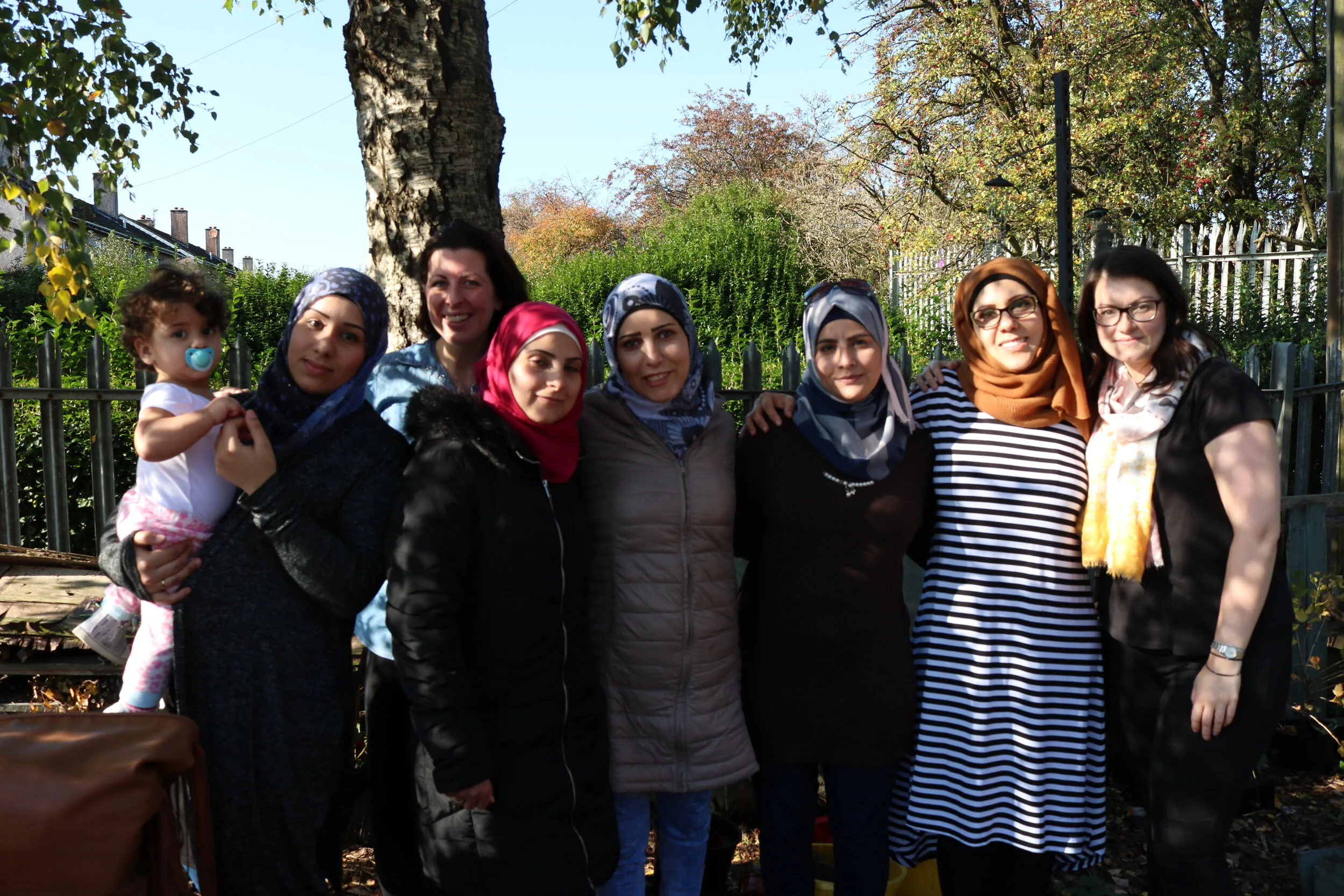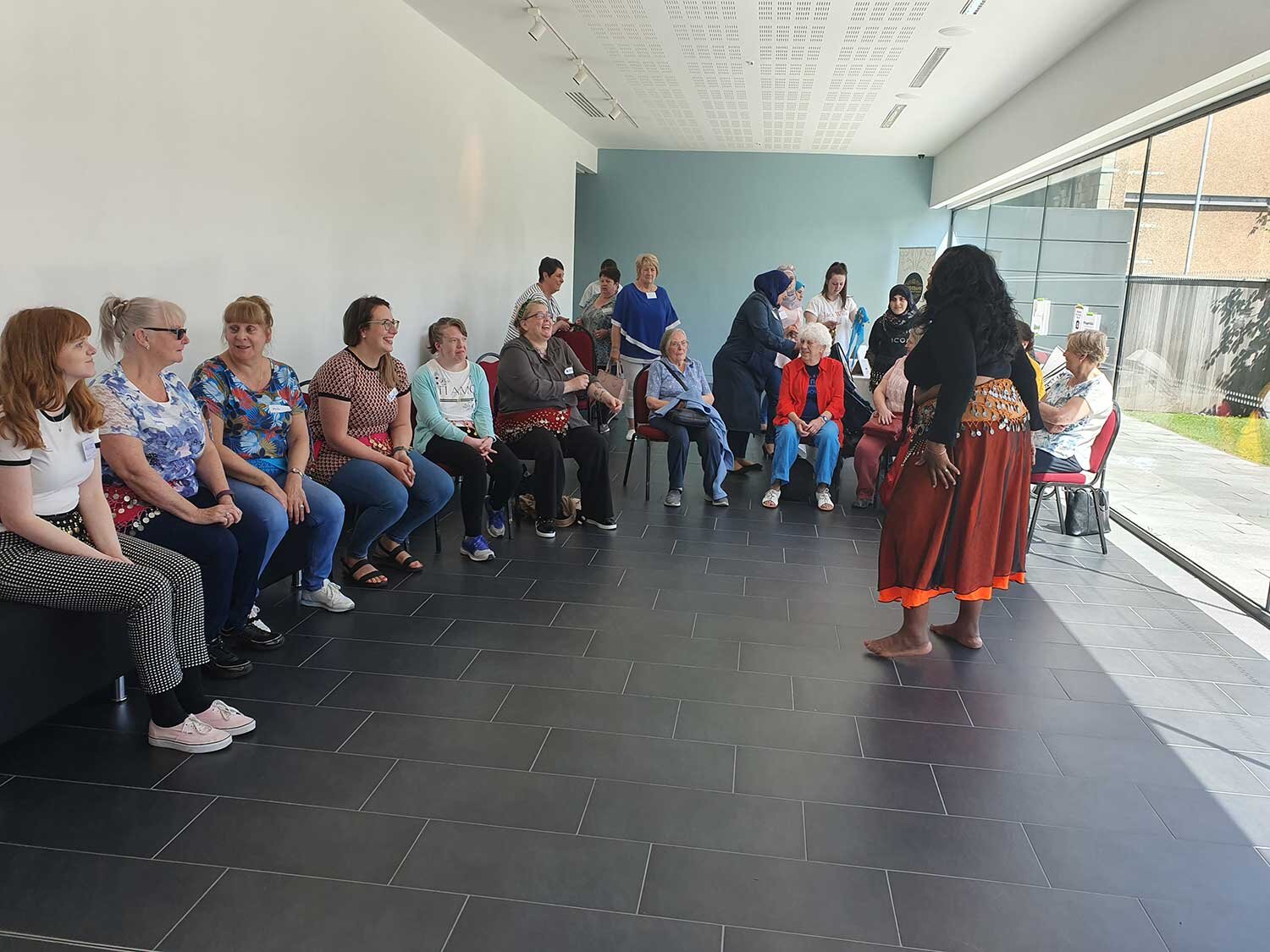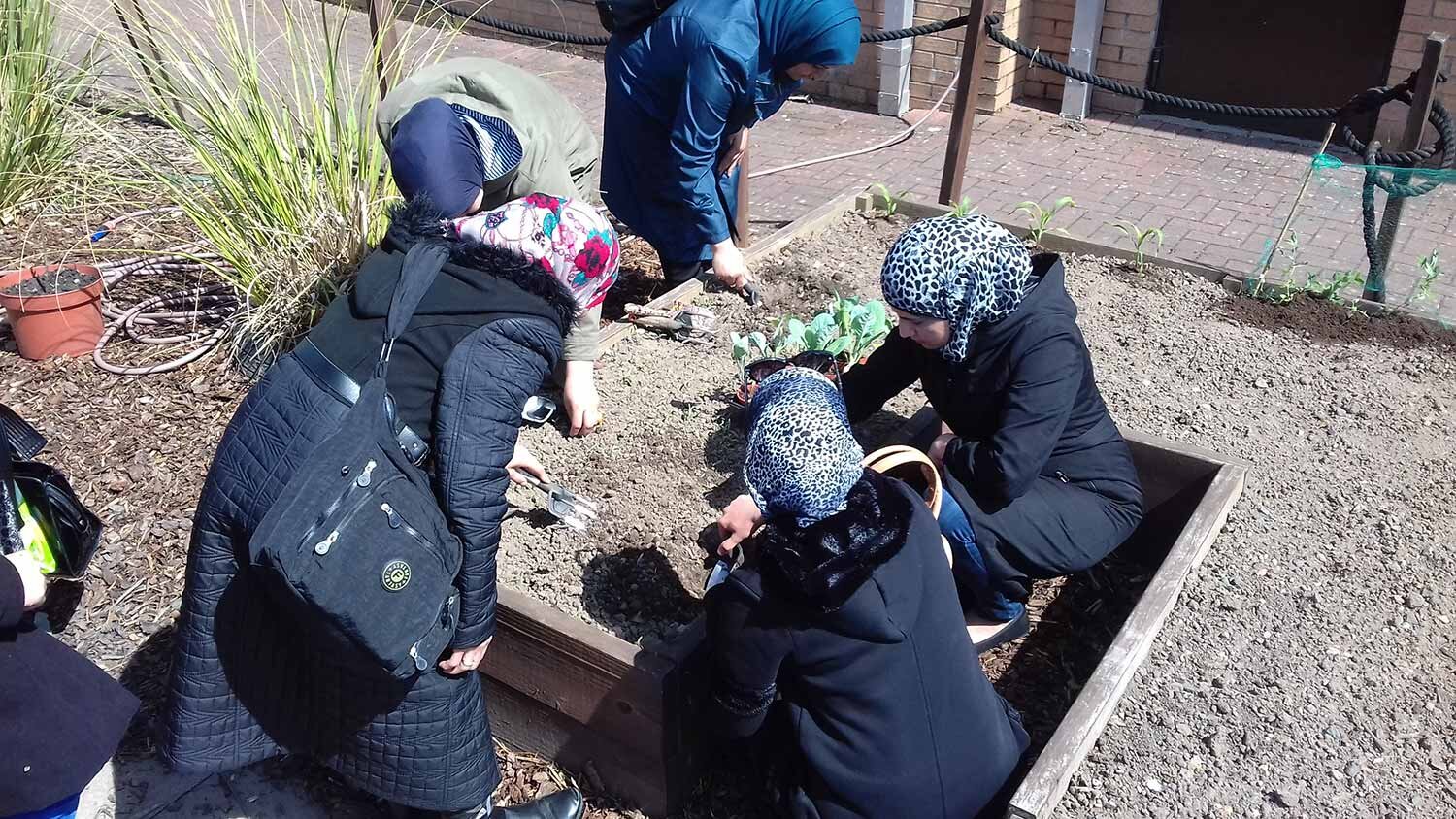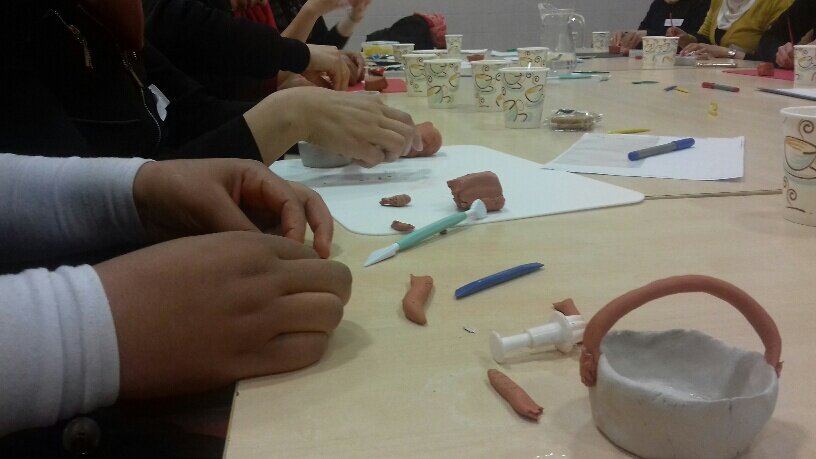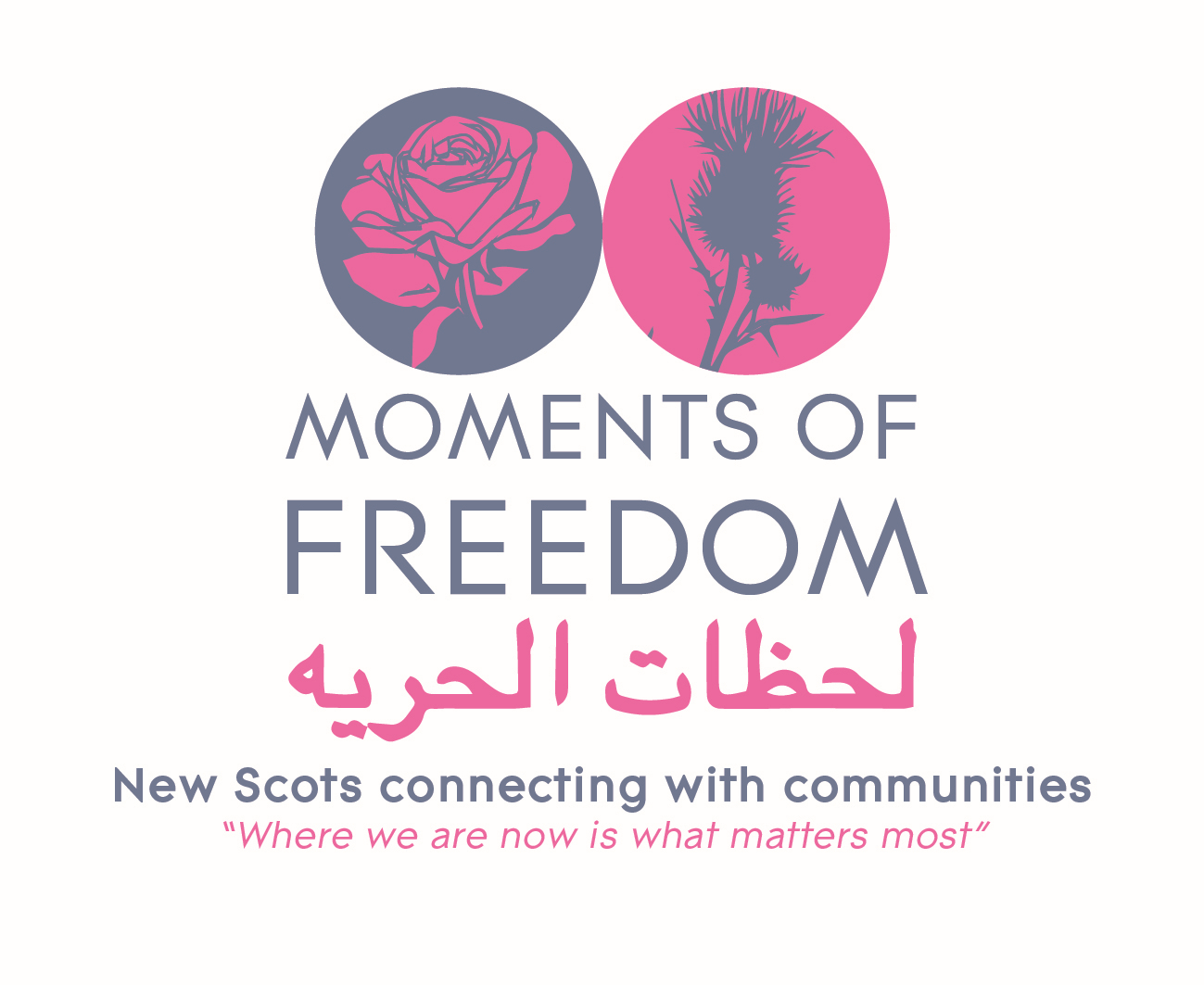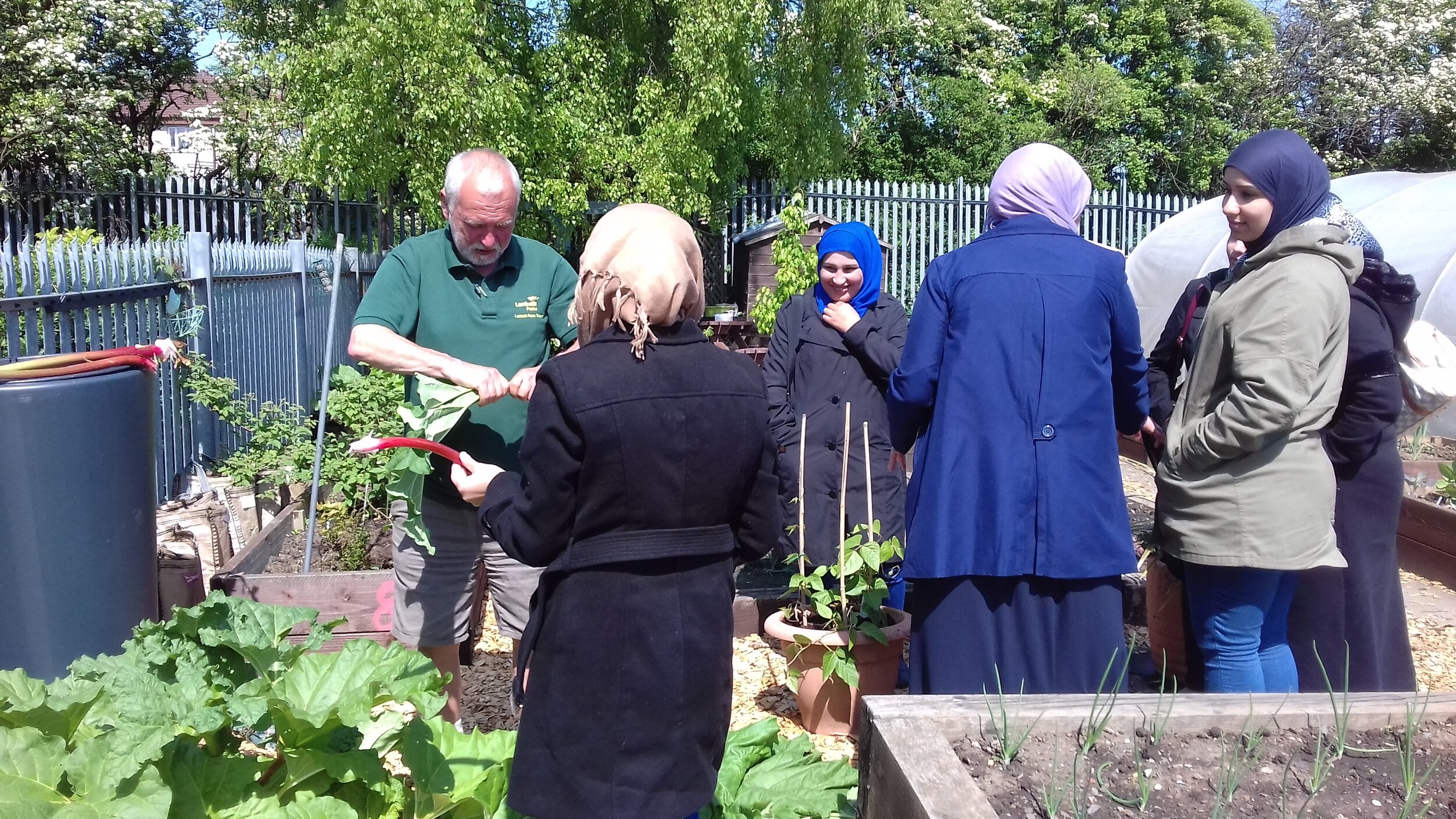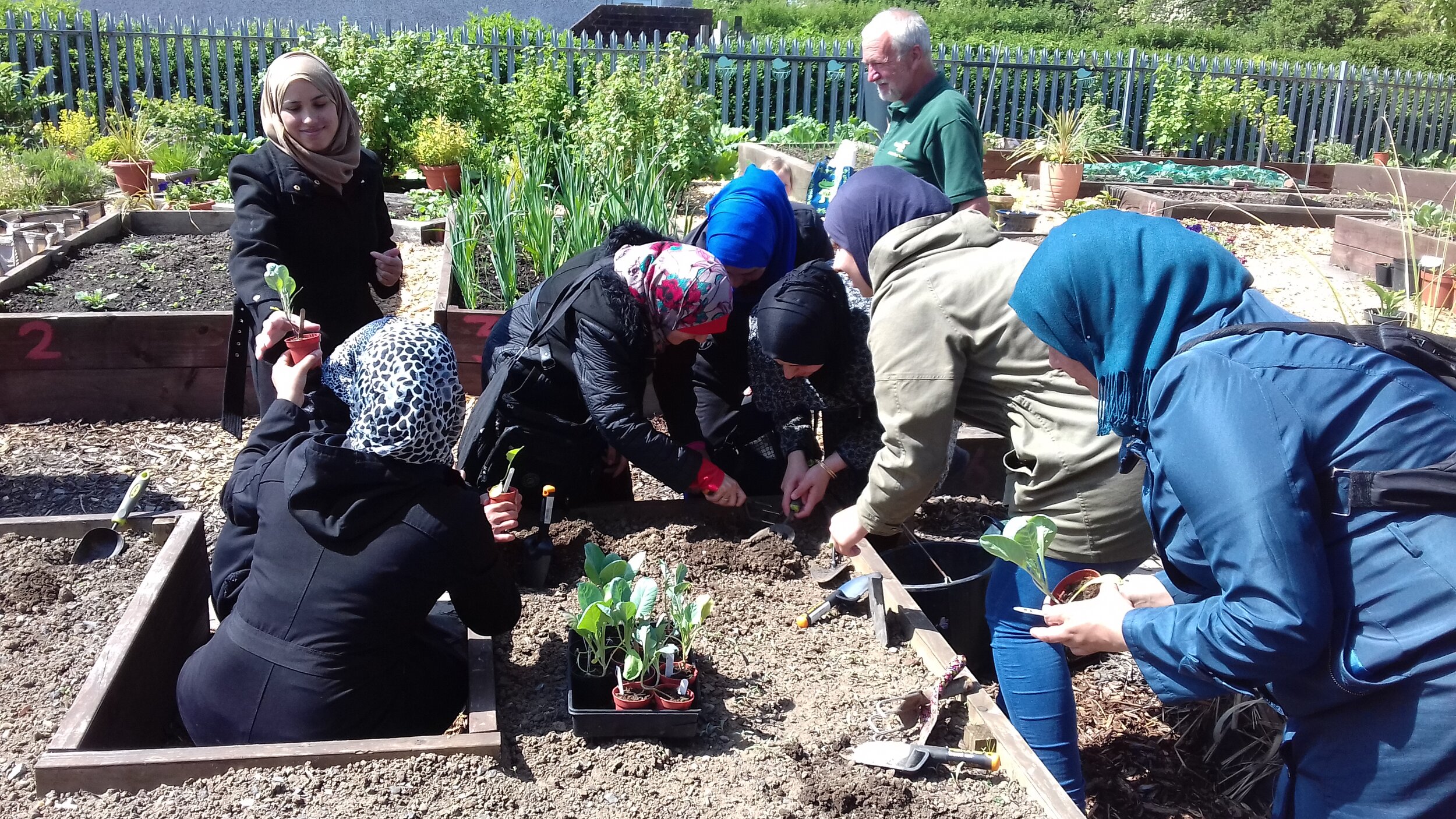Moments of Freedom is a project that we lead as New Scot women in Clydebank. Our purpose is to make connections via associations and partnerships in our local community so that we have opportunities to learn from each other. Examples of how we do this are:
Co-hosting women’s wellbeing community gatherings- online and in different venues across Clydebank.
Delivering presentations about our project and what we have to offer.
Co-delivering cross cultural events to celebrate the diversity in our local community.
This website tells of our journey, written by community development charity Outside The Box. We hope that others will find it useful.
THE PILOT
September 2017
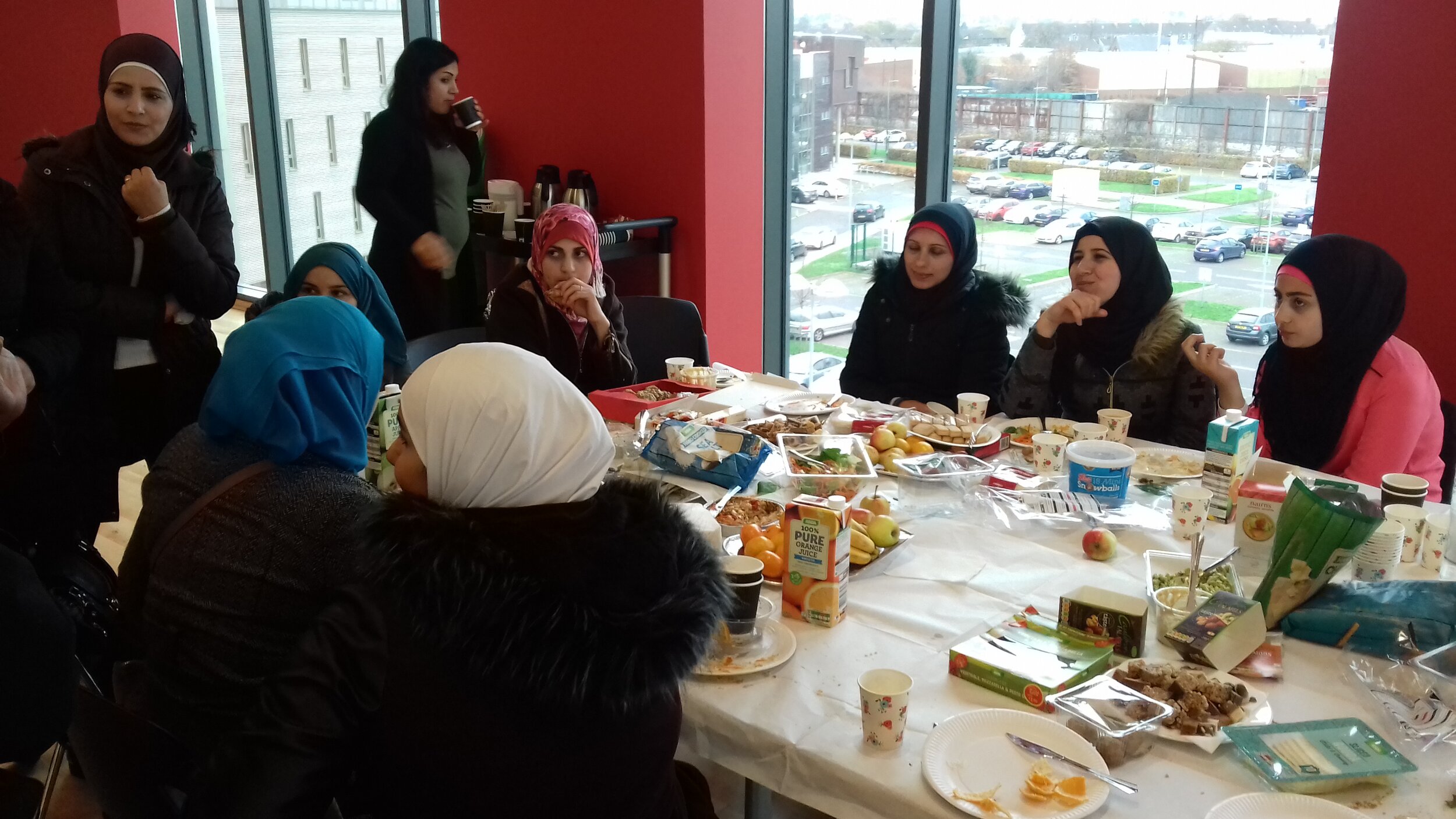
The local context
Unlike central Glasgow, which has a wealth of third sector organisations, in Clydebank, most provision is service led, meaning there are gaps in opportunity for community led involvement. This was the point from which we began the pilot, as an informal space for the women to have some time to themselves to enjoy activities of interest. The pilot project was shaped by a model of asset based participation so that we could gain a sincere understanding of how the women would like to shape their new journey in Scotland.
Where we started
In September 2017 Outside the Box began a pilot in partnership with the New Scot women and West Dunbartonshire Resettlement Team. Many of the women had recently arrived in Clydebank as refugees under humanitarian protection. Together we identified the desire to make links with their wider community and began to work collaboratively on how we could best achieve this. During this time we took the time to get to know each other through different activities. By taking the time in the beginning stages to connect, we were better equipped to plan together for a new project led by the women.
A Journey to
Moments of freedom
AUTUMN 2017

Before Christmas of 2017 we planned for a project that was responsive to the intersections the women face in their daily lives by working in collaboration to overcome the barriers to their wellbeing and integration.
Who we are: Dancers, Women, Daughters, Wives, Mothers, Muslim, my name
What we hold dear to us: Culture, family, our strength, growth, power, protection
The Barriers we face
“Lack of time, people’s willingness to listen, the past, being protective of family, new culture, lack of space, felling different, other people’s time, lack of things to do in our area.”
“War, change, stress, fear, death, trauma, protecting our children from the bombs.”
“People’s negative attitudes, doubt, a lack of understanding, the culture we find ourselves in.”
What we have to offer and where we want to be
“Chances to meet people out-with own culture, raising awareness for understanding of difference, scoping what’s available and what we can make happen”
“Sincere integration-sharing skills and what we have to offer”
“Chances to explore, creative activities, education, peer support, a new project”
“Determination, getting to safety, help and support, family, friends, strength as a driver of being alive, where we are now is what matters most.”
We used the Common Third to engage with the women, a creative and reflective tool that helped us share in activities to strengthen our relationships.
Clay modelling pinch pots were a perfect beginning for meeting the women for the first time.
Potting herbs and flowers for their window gardens led onto conversations about a lack of outside space and how we could visit community gardens to link with the people who use them to build greater connections.
A football session; having a culturally sensitive space to be active is really important to the women and something that is lacking in their area. The session got them thinking about how they would like women only swimming sessions at their local leisure centre with other local women.
Belly dancing and food as a celebration of being free to express yourself in a space where there was no judgement, only enjoyment.
On going visits with Wellhall older people’s care home has provided links with the wider community across Glasgow and created opportunities for intergenerational learning.
Pilot Evaluation
December 2017

In December, 2017 we shared the evaluation of our pilot project, in which we made the following plans:
Building on the work we have already begun, the new project will provide the learning necessary for the women to be skilled up to practice community scoping activities based on their existing areas of interest. We will organise ‘inspirational visits’ with local community gardens, care homes and support the women to gather interest with other local groups around women only sports activities. Using the partnerships we have, the women will meet with other people new to Scotland who have been here for a longer period to hear how they have made links with their wider communities and share their learning. These opportunities will allow the women to gain a clearer picture of what journey’s other people have been on to make a new life in Scotland with links to other community led projects across Glasgow.
Gaining the skills and knowledge on how to make links across different peer networks will provide the women with the confidence to shape their community by having a good understanding of how their participation can influence decision making. This will also provide spaces to meet with local groups to raise awareness and share knowledge about what similarities we have but also to help welcome and celebrate our differences. We will work alongside the women to continuously develop links across Scotland with other groups in order to build a model of peer support that anyone new to Scotland can access. Sharing the experiences of people as experts in their own journeys, we will use our peer networks and partnerships to collectively influence local and national policy
After the initial pilot, the project began in April 2018. Through the pilot project and evaluation , the women identified key areas that they wished to explore further, these centred around building local community links and accessing social activites for themselves and their families.
Based on these areas of interest, we developed four broad project outcomes:
Women have the skills, confidence and peer support to navigate the local community, seeking out opportunities for them and their families.
Increased social capital through improved connections between: New Scots families, community groups, third sector organisations and local authority.
Improved communication, opportunities and peer support and for New Scots across Greater Glasgow.
The experiences of New Scots will shape third sector, local government and national government policy and practice.
We also worked with a graphic designer to develop our logo based on a brief provided by the group. The rose and the thistle representing Syria and Scotland.
May-August 2018
Over the next few months we spent time developing the project, and carrying out community scoping.
We helped out in the community garden at Centre 81, a community centre in Clydebank, where we shared stories about growing and spent time getting to know one another while developing our project ideas.
We took an inspirational visit to the Glasgow Women’s Library.
We took part in a family day out, and met new people at the Glasgow Canal Festival
After carrying out some community scoping activities, the group found there was a lack of activities in the area that brought women together in a welcoming space that also allowed children. So they decided to start hosting community gatherings.
In the first one of these, we invited storytellers and musicians, as well as local community members. This provided an opportunity to connect over arts, crafts and culture, as well as sharing food.
telling our story
November 2018 - February 2019
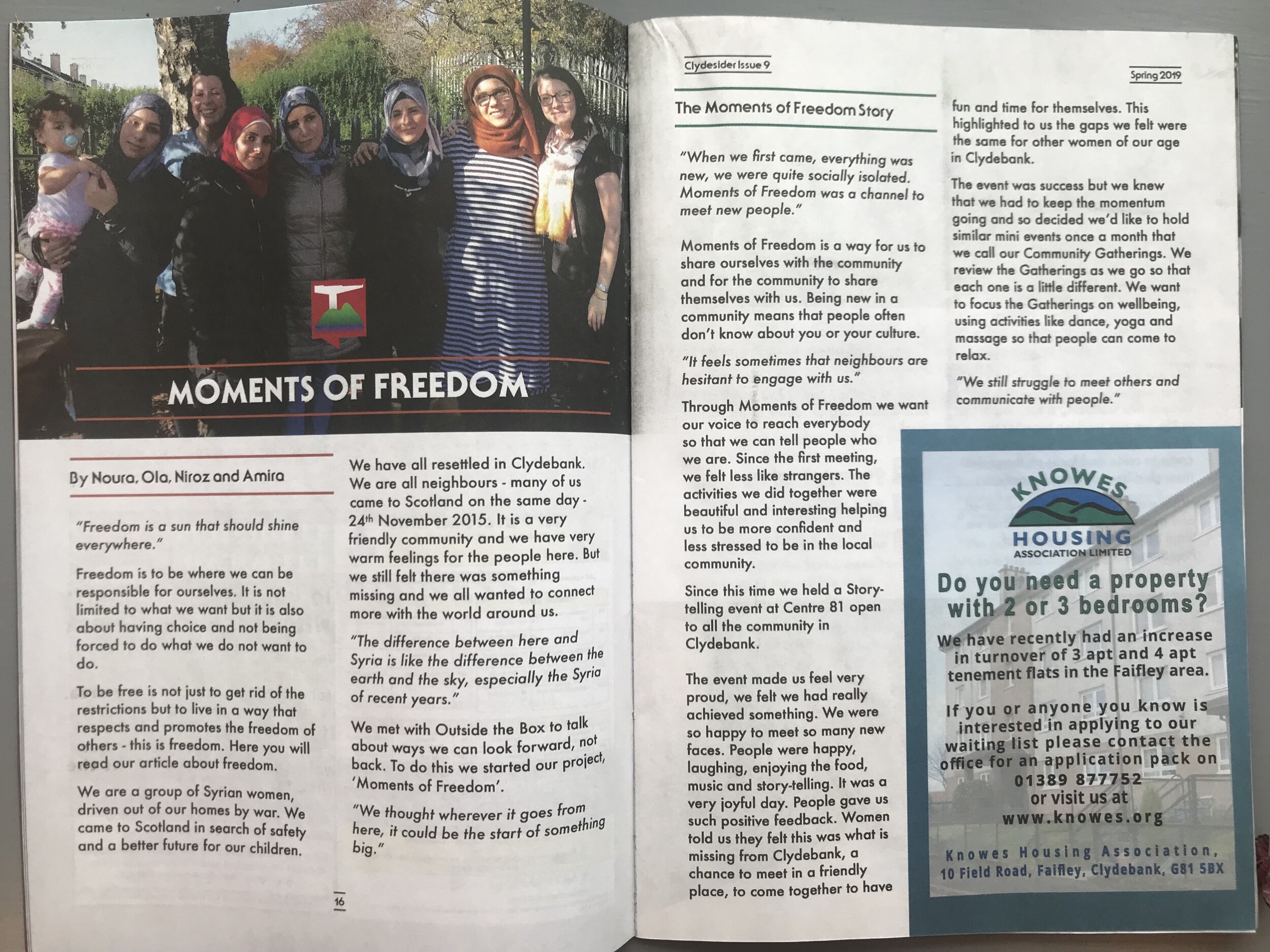
The Moments of Freedom group was asked by local community magazine, The Clydesider to contribute an article for their Spring 2019 issue. The magazine is an important feature of the local community and is available free for all. Here’s what editor, Amanda Eleftheriades-Sherry had to say about the group:
I had the pleasure of attending one of the first community events organised by the Moments of Freedom group and heard from some of the women talk about their experiences making a new life for themselves and their families in Clydebank. I told them about Clydesider and how we are trying to tell inspirational stories and asked if we could feature them in a future issue. The group was keen to tell their own story so I met again with some of the women, this gave us time for a more in-depth discussion about news in general and Clydesider in particular – we talked about the need for more good news to encourage people to get involved in the many positive things happening in their communities and to help people understand each other better. This article by the Moments of Freedom group definitely does just that!
Making new connections
March 2019

“Moments of Freedom is a way for us to share ourselves with the community and for the community to share themselves with us.”
As part of the group’s work in making connections in the local community, on International Women’s Day, they met with the West Dunbartonshire Women’s History group.
This was a truly inspirational meeting across generations of women sharing their stories of the impact of war on their social history through the Clydebank Blitz to being forced from Syria and arriving in Scotland.
“The young Syrian women were a delight to be with and so friendly and forthcoming. We certainly hope we can exchange another visit in the near future.”
The importance of documenting women’s social history and stories of survival has given hope for the future, looking forward with real joy and support for each other; something to be celebrated as part of International Women’s Day.
Identifying and filling a community need
June 2019
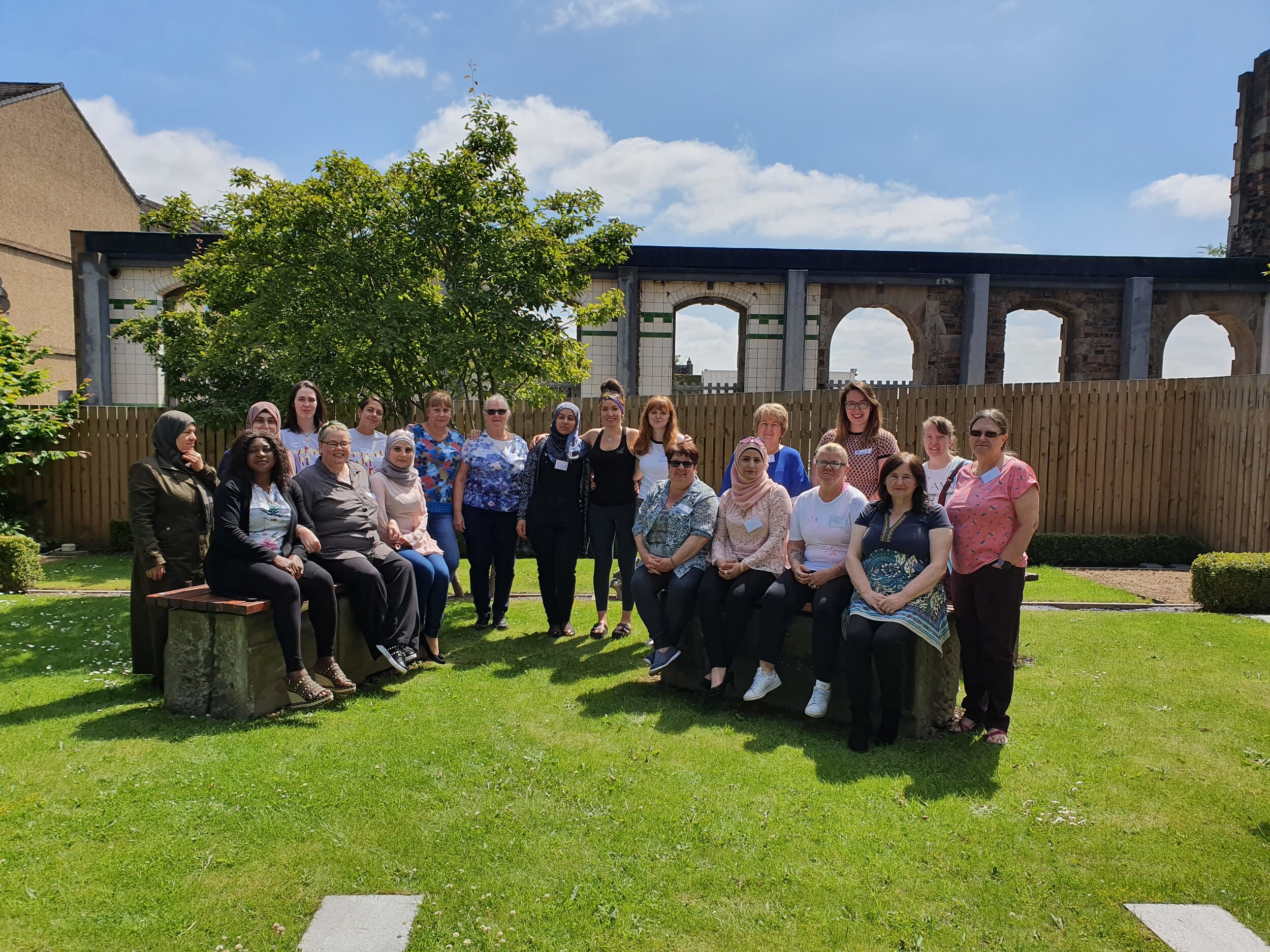
We applied for funding from the Scottish Refugee Council to hold a Women’s Wellbeing event as part of the Scottish Refugee Festival, 2019
Writing about the event for Scottish news website, CommonSpace, the group said:
We wanted to hold community gatherings to try and break down barriers. The gatherings have been good, but it can be hard to maintain those relationships afterwards. It is still a struggle to meet other people. Many of our neighbours have been so warm and friendly, but others don’t say hello when we see them in the street.
When we started to organise these events and meet with other women in the area, we realised there was a need to have more local events that were safe spaces for women to come together.
Women hold everything together and keep everyone safe, but to do this, it’s important to look after ourselves as well. We are always busy with children and family, housework, shopping, learning, college. That’s why we need spaces just for us. It’s only when our children are asleep or at school that we get any time for ourselves.
We really enjoy the opportunity to connect with other groups and volunteer. We do this purely for ourselves and we feel good about that. It feels nice to be with other women, it’s fun and we feel powerful. This is why we decided, for Refugee Festival Scotland, to hold a woman-only wellbeing event.
It will be a safe, welcoming space for women to express themselves through different activities such as belly dancing, yoga and the cultural exchange of ideas through arts and food. Jennifer T. Doherty, author of new book, Glasgow’s Welcome which celebrates the warm welcome given to new arrivals will be there. We’re going to create recipe cards with dishes from Syria to share with local women from the community, to help build connections through food. There will be also be a ‘chill-out’ space where we will be creating a ‘botanical mural’ celebrating wellbeing themes of growth and renewal.
Moments of Freedom were asked to provide information to the Convention of Scottish Local Authorities (COSLA) about the project. As well as giving a presentation, they showed this video:
The group was also recognised in the Council for Ethnic Minority Volunteer Organisations awards ceremony, where they were runners up in the Community Development category of the Ethnic Minority Impact Awards. They attended a glitzy award ceremony in Glasgow.
The story was featured in both the Clydesider community magazine and the Clydebank Post.
The theme of fulfilling work which we propose to build on in the 3rd year of Moments of Freedom – recognises that a person’s income, sense of purpose, social connections and personal agency are all affected by their employment.
The World Health Organisation (WHO) defines mental health as a:
“a state of wellbeing in which every individual realises her or his own potential, can cope with the normal stress of life, can work productively and fruitfully and is able to make a contribution to her or his own community.””
The next phase of the project proposes that we build on the women’s skills having identified gaps in their community to support the need for safe spaces that respect the wellbeing of women. The group are now at the stage of moving towards opportunities for fulfilling work that is responsive to the intersections they face as New Scot women in Clydebank.
The women have all expressed their desire to work but in doing so feel that there are barriers to accessing employment as New Scot women. The project plan will seek to address these barriers as follows.
keeping the group going
2020 - 2021
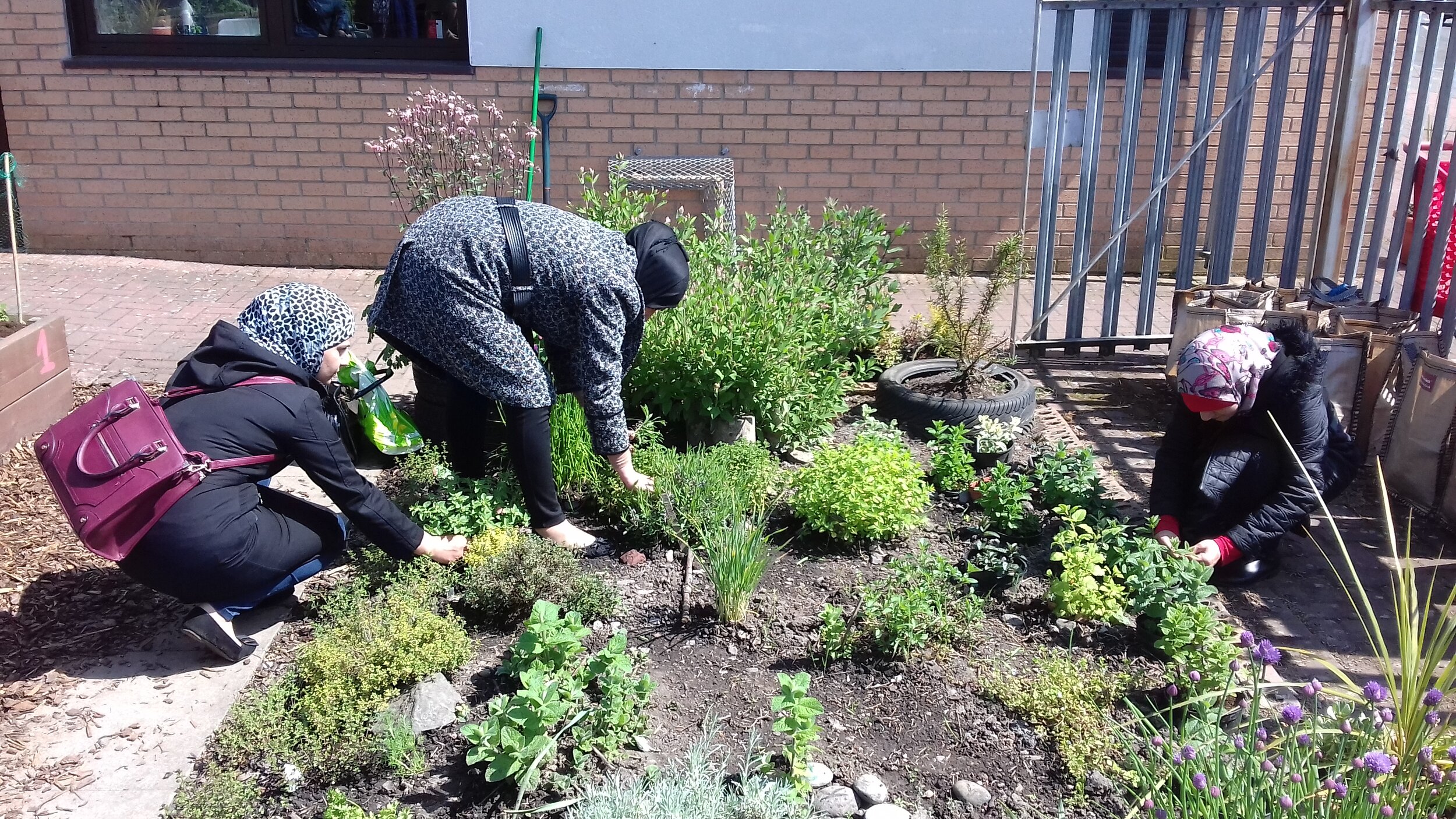
We moved the in-person peer support sessions onto Zoom immediately after the first lockdown was announced. These continued until restrictions were lifted in 2022.
The women talked about their resilience and how they had overcome challenges before – they saw their transition from an in-person group to a digital group as a big achievement. They were aware that many community groups were unable to make that transition and were determined to ‘keep the group going’.
At the end of the year, we secured a small grant from the Women’s Fund to set up intergenerational digital conversation cafés with older people from Trust Housing in the Western Isles.
“There are so many ways for us to challenge – we do it with co-operation and empathy every step of the way.”
“It’s been a tough year, but we feel still meeting through lockdown with home schooling and children at home, has been a huge achievement for our group.”
creative, welcoming community
2022
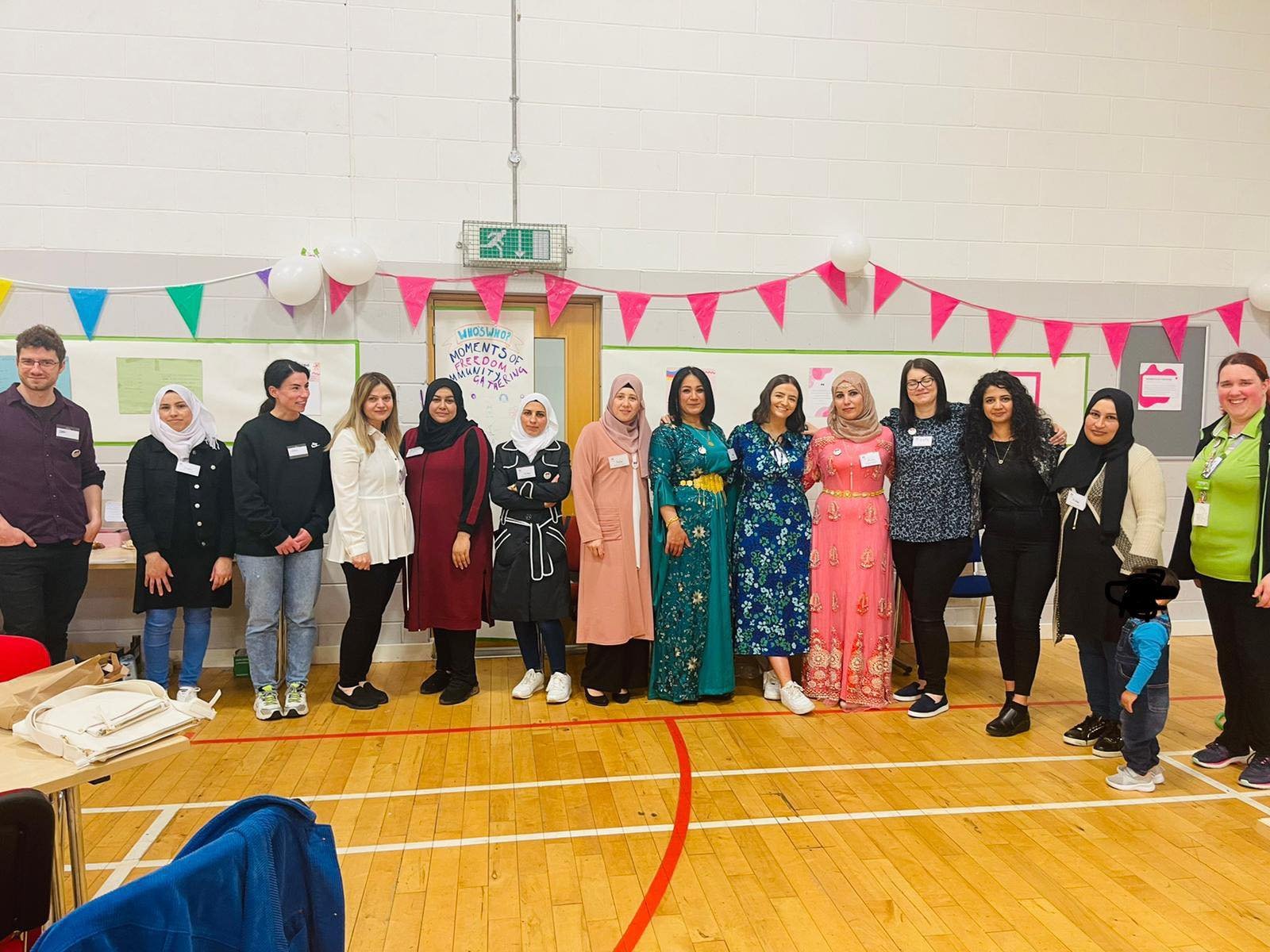
In March 2022 the women hosted a welcome event for newly arrived women from Afghanistan where they shared the clay activity from their first session in 2017. This was supported by Syrian and Pashto interpreters.
One group member led a session on ‘Poetry Writing’ and how the group can use this powerful tool to share their messages. They wrote more articles for The Clydesider and developed a community survey to gather local opinions about cultural awareness.
The women held two community gatherings in 2022 and each time the group welcomed over 30 community members, groups and elected officials to Centre 81. Martin Docherty-Hughes MP provided a video to share with the guests to welcome them and the women also got the chance to meet their new Councillors for Waterfront and Central.
The women worked with Ignite Theatre over the summer to facilitate a series of film making workshops. This culminated in their short film screening at The Glasgow Film Festival. The women were also interviewed the next day by the STV News at 6 team in Centre 81, Clydebank. These interviews were put into a segment on the evening news all about Moments of Freedom and the work the women are doing in Glasgow.
learning and connecting with our wider communities
2023

As the group has developed, we could see a core group forming and a wider network of stakeholders; local New Scots who chose not to attend the fortnightly sessions, other residents, representatives from groups and organisations and elected representatives. The plans for this year formed around hosting shared learning sessions that provided the group with opportunities to benefit from the services available and share their knowledge and experience to better inform the service delivery of these agencies.
Outside the Box hosted a Parliamentary Reception in April with over 50 guests and MSP’s. As the reception fell during Ramadan, the women created a video to be screened during the reception to explain to guests and MSPs more about their work, the group and why they were unable to be there in person
The women held another community gathering in June as part of the Scottish Refugee Festival, bringing 60 people together, including 25-30 New Scots women and representatives from West Dunbartonshire Council, Housing Association, NHS, HSCP, Community Police, arts organisations, support groups, MSP’s assistants, Local councillors, and other local residents.
In partnership with The University of Strathclyde Law Clinic the women received ‘Public Legal Education’ sessions to support people to better understand their rights. Through a facilitated discussion the women were able to identify key areas where they would benefit from accessible information and advice regarding Scots Law and their rights.
With support from another piece of Outside the Box funded work the women were able to attend 3 exchange trips with a Syrian women’s group based in Kilwinning, North Ayrshire. Through these exchanges the women have been able to share their expertise and learning about developing a women’s group, meaningful integration, partnership working, and how they are influencing local services and activity. The two groups have since set up their own WhatsApp Group to continue sharing information and peer support.
Later in the year the women met and had surgeries with their local Councillors and MSP Marie McNair. They were able to access support and open casework on issues with utility companies, housing issues, and legal issues in their own space with the group’s interpreter.
